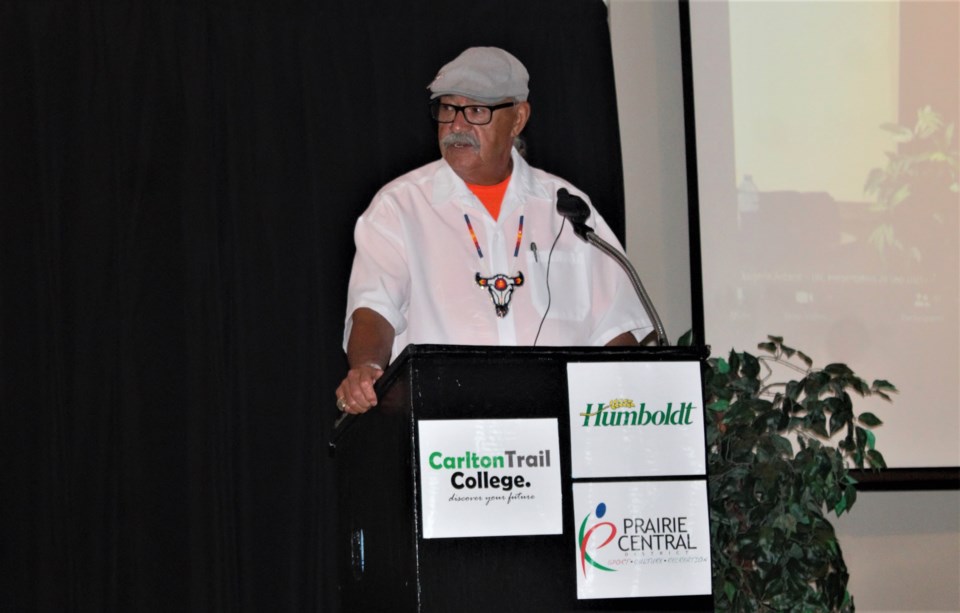HUMBOLDT — Eugene Arcand learned to survive in the residential school system. To eat, he stole, to survive he lied— and when he came out he carried with him a hardened shell and lack of fear.
“I’ve never experienced hunger, not until I went to a residential school,” Arcand said.
“They called the number 781, from then on I was 781, and from then on it became an odyssey of every day being a threat of physical, sexual, physiological and emotional abuse. It was an odyssey that I would not wish on anyone, on any land at any time.”
Arcand, a Cree man from the Muskeg Lake First Nation, suffered through 11 years in the residential school system— from 1958 until 1967 at St. Michael's Indian Residential School in Duck Lake and from 1967 until 1969 at Lebret Student Residence.
Arcand shared his story in Humboldt to over 100 community members tuning in over Zoom and a filled Jubilee Hall in the Uniplex, as part of an event on Sept. 28 hosted by the City of Humboldt, Prairie Central District for Sport, Culture and Recreation and Carlton Trail College.
The residential school system, which ran from 1831 to the late 1990s’, was designed with the objectives of assimilating Indigenous youth into Euro-Canadian and Christian ways of living.
The schools would forcibly separate children from their families and forbade them to use their own languages or acknowledge their Indigenous heritage. If the students disobeyed, they would be beaten.
Around Labour Day, school would start. The following Thursday, Friday, Saturday and Sunday he and his classmates were used as slave labour in the fields to pick potatoes, carrots and turnips.
To this day Arcand said he hates September.
“It didn’t take me very long to realize athletes were treated different, you got a little more food and you got a few little privileges. Plus once in a while they let you get out there, because missionaries like to show off the gifted kids.”
After escaping the place he now refers to as “hell,” he continued with soccer and hockey, receiving dozens of awards for his role in promoting sports, recreation and cultural opportunities for First Nations youth in Saskatchewan, as well as a spot in the Saskatchewan Indian Sports Hall of Fame.
Arcand continued on to represent Saskatchewan on a national survivors’ committee on the Supreme Court of Canada case on whether records should be destroyed on the detailed accounts of horrific physical and sexual abuses collected during the residential schools assessment process to decide financial compensation from the class action lawsuit.
Multiple survivors and the federal government argued that the records should be preserved at the National Centre so that the cultural genocide committed in the schools will always be part of Canada’s history. Ultimately, the Supreme Court ruled to destroy the records as the stories were collected with survivors being told they would be kept private and signed confidentiality agreements.
Arcand challenged every person to memorize the Truth and Reconciliation Commission’s Calls to Action, not as recommendations but calls to action that determine the future of the country and the relationship between the communities.
“It’s not about pity or feeling sorry, that’s not what we want, we want the same as everyone else, we want the opportunity for our children to have a career, to progress, to contribute to society, to share our worldview.”
To media after the event, Arcand said he was honoured to come to Humboldt to share his lived experience, and hopes people take away a better understanding and respect for Indigenous relationships.
“I want people to understand we have a worldview and we want to share it and we want to make life better for everyone else— for all the people of Humboldt and area,” Arcand said. “I want people to understand change is required and we have this window in our province to do it, the status quo is not okay.”
Former Residential School students can call 1-866-925-4419 for emotional crisis referral services and information on other health supports from the Government of Canada. Indigenous peoples across Canada can also go to The Hope for Wellness Help Line 24 hours a day, 7 days a week for counselling and crisis intervention 1-855-242-3310.






